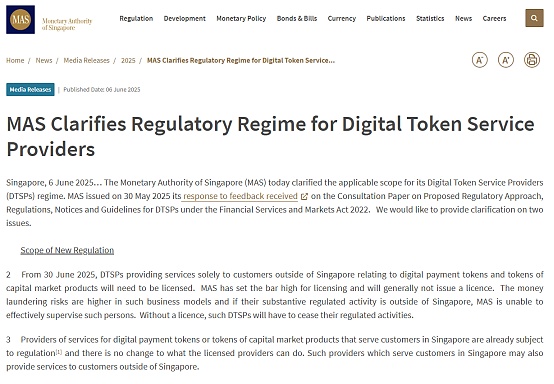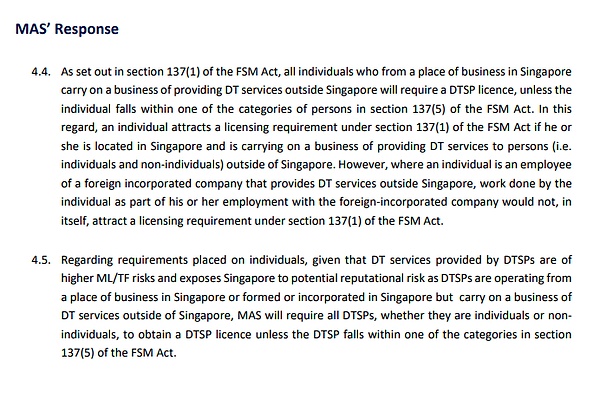Under the strong support of the United States, the global market seems to be relaxing regulations on the crypto market, but one country is going against the trend.
On May 30th, the Monetary Authority of Singapore (MAS) issued the final policy guidelines for Digital Token Service Providers (DTSP), announcing thatthe new regulations for Digital Token Service Providers (DTSP) will officially take effect on June 30th. According to the new regulations, all crypto service providers registered or operating in Singapore must cease providing services to overseas customers by June 30th, 2025, if they have not obtained a DTSP license.
This move caught the crypto market off guard, with local practitioners lamenting and the market echoing calls for a "Web3 mass exodus" from Singapore. Is it a retreat or defense? A planned move or radical dictatorship? The rapidly changing regulatory landscape is disrupting the market, with compliance horns blowing globally, and the industry inevitably following the tide.
01 Relying on Regulatory Advantages, Singapore Becomes a Web3 Development Hotspot
Going back4 years ago, during China's massive crypto industry clearance, before Hong Kong had issued its virtual asset declaration, and as the sovereign status of the Western crypto world was rising, Chinese Web3 entrepreneurs unanimously chose Singapore as their next safe landing point.
The reason for choosing Singapore was simple. Singapore is considered the best springboard for Western markets, not only possessing advantages of economic development and political stability but also being more culturally compatible for Chinese people. In this context, talent, projects, derivative investments, and service institutions gathered, making Singapore a hot investment ground for Chinese Web3. At that time, over 47 crypto exchanges were located in Singapore, with Coinbase, Binance, and FTX all choosing Singapore as their Asia-Pacific headquarters or R&D centers. The big players also once used Singapore as a haven, with CZ having a record of long-term residence in Singapore, and Wu Jihang already being a permanent resident.
Of course, the core of all this was inseparable from Singapore's policy openness. From a policy perspective, Singapore introduced the Payment Services Act in2019, clearly defining digital token licenses and requiring local companies providing crypto exchange services to apply for licenses based on the nature and scope of services, including "currency exchange", "standard payment institution", and primary payment institution licenses. In 2020, Singapore passed the "Crypto Issuance Guidelines" and proposed the "Financial Industry Comprehensive Act", essentially establishing the basis for crypto licensing and clear responsibilities. Looking at the global crypto market at the time,China had clear bans, US regulatory agencies were embroiled in a power struggle, European countries struggled to unify their systems, and Singapore was the first to create a relatively relaxed and clear policy regulatory environment with exemption clauses temporarily allowing specific payment services.
And it was this Singapore that on May 30th issued the Digital Token Service Providers (DTSP) final policy guidelines, followed by the final response document to the DTSP regulatory consultation under Section 9 of the Financial Services and Markets Act 2022, ultimately making it clear that no license means no service, and providing no transition period, throwing all practitioners into panic.

02 Cliff-like Regulation? Singapore Introduces Strictest New Rules
First, it needs to be clarified that the market's circulating "mass exodus" and "cliff-like regulation" are somewhat exaggerated. Singapore's regulatory signs for the crypto field had long been apparent. In 2022, Singapore's MAS introduced the Financial Services and Markets Act, with Section 9 specifically introducing the Digital Token Service Provider (DTSP) licensing system, which was the first time this system appeared in Singapore's legislation. In June, Singapore's fintech policy head stated that Singapore would take "cruel and merciless strict measures" against misconduct in the crypto industry.
The collapse of FTX at the end of 2022 was a key turning point. FTX's fall exposed a series of investment institutions, including Singapore's sovereign wealth fund - Temasek Investment Company. Because of FTX, Temasek was forced to write off a $275 million investment. After this incident, the Singapore government clearly stated reputational damage and even imposed salary cuts on the investment team and senior management.
In May 2023, the Financial Services and Markets (Amendment) Act was passed, strengthening information sharing between financial institutions to combat money laundering and terrorist financing, and inAugust of the same year, incorporating stablecoins into the framework.
In 2024, MAS initiated a consultation document on regulatory methods, regulations, notices, and guidelines for digital tokens. The wording in the document is particularly noteworthy: "Due to the internet-based and cross-border nature of digital token services, Digital Token Service Providers (DTSPs) are more likely to face money laundering/terrorist financing (ML/TF) risks... The main risk DTSPs pose to Singapore will be reputational risk, potentially damaging Singapore's reputation if they are involved in or misused for illegal purposes."
Finally, onJune 30th this year, the Digital Token Service Providers (DTSP) new regulations will officially take effect. Looking back at this regulatory process, from proposal to implementation, there has actually been a preparation period of up to 3 years, with clear progressive signals from the government, obviously not a cliff-like regulation scenario.
Globally, the licensing system is the core of crypto regulation, as seen in the US, Hong Kong, and Europe, and Singapore's previous Payment Services Act also used licensing as a means of subject control. As to why a small license could cause such a huge uproar, it goes back to regulatory arbitrage.
The crypto industry does business globally, but regulatory systems are typically territorial, creating the possibility of arbitrage - obtaining a license in a regulatory low point and then conducting business globally, which has become an industry consensus. In Singapore's previous regulatory regulations, while requirements for local business were strict, overseas business was very loose, meaning companies registered in Singapore could freely provide services to overseas customers, which naturally aligned with crypto business. It was against this backdrop that numerous exchanges chose to flood into Singapore.
However, this arbitrage will be officially terminated in the new regulations. Looking at the specific content of DTSP, the regulation can be described as stringent.First, the subject is clear and comprehensive - anyone and any enterprise with a place of business in Singapore engaging in digital token-related business, regardless of operational location, must obtain a DTSP license. Second, the definition of "place of business" is very broad, with officials explicitly stating that "place of business" can be any location for conducting business, even including temporary or mobile locations like street stalls. This is a special provision targeting the crypto industry, especially for remote and work-from-home personnel and companies. The regulated services cover almost the entire industry chain, from token issuance, custody, brokerage, trading matching, transfer payments, verification governance to custody technology development, ensuring no loopholes.

Apart from the content related to license regulations, the license entry threshold is extremely high. The regulatory authority MAS clearly stated that it will only issue DTSP licenses in "extremely limited cases," requiring not only a reasonable business model from applicants but also ensuring that operational methods will not trigger regulatory disputes. This includes obtaining regulatory permits in the operational location and even having organizational requirements, with governance framework and capital adequacy taken into consideration. In fact, the strictness of license issuance can be seen from the current number of licenses issued. In the Singapore boom of 2021, over 500 institutions submitted license applications to Singapore. However, four years later, the MAS official website shows that only 33 enterprises such as BITGO, Circle, COINBASE, GSR, Hashkey, and OKX SG have obtained DTSP licenses, with an application approval rate of less than 10%.
It is worth noting that the license system has certain exemption spaces. Enterprises that have already obtained licenses under Singapore's Securities and Futures Act, Financial Advisers Act, and Payment Services Act do not need to reapply for DTSP, only needing to implement audit and risk management requirements. This is relatively friendly to enterprises that applied for licenses during the previous relatively relaxed phase. From the official website, 24 enterprises including COBO, ANTALPHA, CEFFU, and MATRIXPORT are on the exemption list. On the other hand, if individuals are merely working remotely as employees, signing contracts with overseas-registered entities and serving overseas customers, they do not need to apply for a license. However, if participating in business locally in Singapore as an individual, they will be included in the regulations.
In summary, entities that have neither applied for licenses nor are within the regulatory scope will face elimination before June 30, whether individuals or enterprises, which almost covers the entire industry chain. Especially for startups, the minimum paid-up capital of 250,000 Singapore dollars and annual fees of 10,000 Singapore dollars for licensed institutions will only result in another major migration. Currently, not only are individual practitioners planning to leave Singapore, but some crypto exchanges are also considering relocation. "Compared to other regions, Singapore's costs are not advantageous, and under the background of tightening compliance, some exchanges may move to Hong Kong for market considerations. Individual practitioners have more choices, including lower-cost Southeast Asian countries, Dubai, and Japan. Even without new regulations, the number of practitioners leaving Singapore has been increasing," said a crypto exchange practitioner working in Singapore.
Regarding Singapore's new regulations, Hong Kong has also launched a talent recruitment declaration. Recently, Hong Kong Legislative Council member Wu Jiezhuang posted on social media, "Since Hong Kong issued the virtual asset declaration in 2022, we have actively welcomed industry development. According to unofficial statistics, over a thousand Web3 companies have settled in Hong Kong. If you are currently working in the related industry in Singapore and are interested in relocating your headquarters and personnel to Hong Kong, I am willing to provide assistance and welcome you to develop here!" Thus, this seemingly simple regulation will have far-reaching impacts on the global crypto industry landscape in the long term.
From a policy perspective, Singapore's approach is very resolute. Not only does it directly face the potential loss of projects due to strict systems, but it also clearly expresses the government's zero-tolerance attitude towards regulatory arbitrage and sounds an alarm for local Web3 industry development. Leniency is gone forever, and tightening is the key. By imposing high compliance costs, it thoroughly cleanses small and gray projects, clearly encouraging large enterprises with strong backgrounds, capabilities, and sufficient capital to settle, with the policy's starting point being industry health and sustainability.
Essentially, why is Singapore so determined to increase regulation? Besides the local rule of law spirit, the key is that industry benefits cannot offset negative externalities. From a national perspective, while the crypto industry seems to be expanding, its unique decentralized nature and global business operations result in significantly lower tax revenues compared to equivalent traditional industries. Simultaneously, crypto industries have continuously bred telecommunications fraud and gray industries. According to Singapore Police Force data, cryptocurrency fraud has become a high-incidence event in Singapore's fraud cases, dramatically rising from about 6.8% in 2023 to about 24.3% in 2024, with the situation becoming increasingly severe. It is worth mentioning that in previous billion-dollar money laundering cases in Singapore, cryptocurrency also played a crucial role. With low tax revenues, high crime rates, and potential internal conflicts from squeezing local residents' production and living resources, Singapore's strict governance approach in issuing regulatory policies is justifiable.
In fact, this is also the consideration in our country's regulatory strategy. Compared to Singapore, our country has a massive population base, making regulation more complex and policy arbitrage more astonishing. Ultimately, our country chose a more hardline "one-size-fits-all" governance, while Singapore retained part of the market to balance regulation and innovation.
A glimpse of the leopard reveals Singapore's transformation, which also echoes global regulatory changes. For the crypto industry, the compliance trend is unstoppable, and compliance has transformed from an optional choice to a mandatory question. In the past, global crypto enterprises' development strategies were about finding regulatory blind spots, gathering in grayer areas. However, now, with clear regulatory mechanisms established in the United States, Europe, Hong Kong, and Singapore, only by embracing compliance and moving towards transparency can true long-term development be achieved. Compliance to some extent determines the industry's fundamental tone, with large institutions having far higher bargaining and competitive capabilities, inevitably squeezing the opportunities for startups. From mainland China to Hong Kong, and from Hong Kong to Singapore, and now setting sail again, for startups, wandering is not scary. Finding the most suitable "grassland" that aligns with their business might be the key issue to resolve in the development process.








